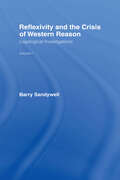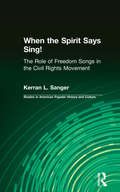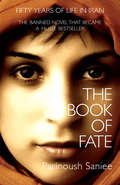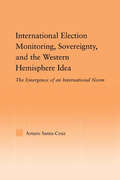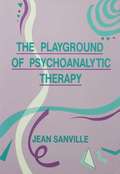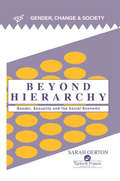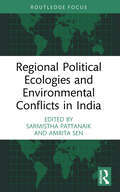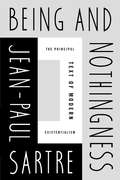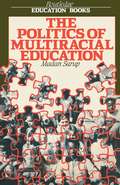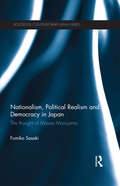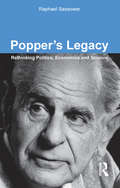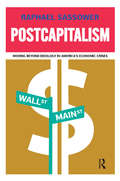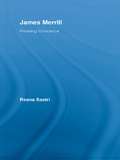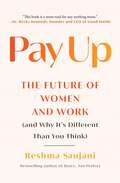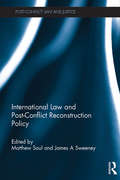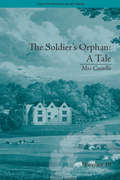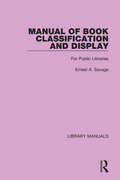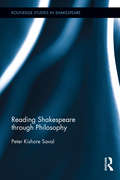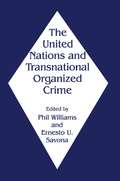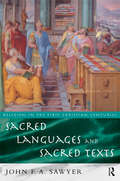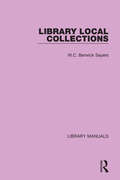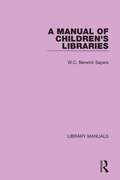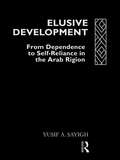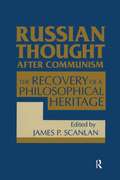Special Collections
Benetech’s Global Certified Accessible Titles
Description: Benetech’s GCA program is the first independent third-party EPUB certification to verify ebook accessibility. By creating content that is born accessible, publishers can meet the needs of all readers. Learn more: https://bornaccessible.benetech.org/
- Table View
- List View
Sufi Commentaries on the Qur'an in Classical Islam
by Kristin SandsMeeting the ever increasing interest in Islam and Sufism, this book is the first comprehensive study of Sufi Qur’anic commentaries and includes translations of many writings previously unavailable in English. It examines the shared hermeneutical assumptions of Sufi writers and the diversity in style of Sufi commentaries. Some of the assumptions analyzed are: * the Qur’an is a multi-layered and ambiguous text open to endless interpretation * the knowledge of deeper meanings of the Qur’an is attainable by means other than transmitted interpretations and rational thought * the self is dynamic, moving through states and stations which result in different interpretations at different times. The styles of Sufi commentaries are explored, which range from philosophical musings to popular preaching to literary narrative and poetry. Other commentaries from the classical period are also investigated to provide context in understanding Sufi approaches and exegetical styles.
Reflexivity And The Crisis of Western Reason
by Barry SandywellThis ground breaking work explores the genealogical analysis of the discourses of reflection. Barry Sandywell traces the differences between the traditional discourses of reflection and the experiences of reflexivity in everyday, social and philosophical thought. Brilliantly organised and abounding with astonishing insights, Reflexivity and the Crisis of Western Reason offers a fundamental challenge to our normal ways of viewing social thought.
When the Spirit Says Sing!
by Kerran L. SangerFirst published in 1996. Routledge is an imprint of Taylor & Francis, an informa company.
The Book of Fate
by Parinoush SanieeSelected as one of World Literature Today's 75 Notable Translations of 2013 Spanning five turbulent decades in Iranian history, from before the 1979 revolution, through the Islamic Republic, and up to the present, The Book of Fate is a powerful story of friendship and passion, fear and hope. A teenager in pre-revolutionary Tehran, Massoumeh is an average girl, passionate about learning. On her way to school she meets a local man and falls in love, but when her family discovers his letters they accuse her of bringing them dishonour. She is badly beaten by her brother, and her parents hastily arrange for her to marry a man she’s never met. Facing a life without love, and the prospect of no education, Massoumeh is distraught, but a female neighbour urges her to comply: "We each have a destiny, and you can’t fight yours." The years that follow Massoumeh’s wedding prove transformative for Iran. Hamid, Massoumeh’s husband, is a political dissident and a threat to the Shah’s regime. When the secret service arrive to arrest him, it is the start of a terrifying period for Massoumeh. Her fate, so long dictated by family loyalty and tradition, is now tied to the changing fortunes of her country.
International Election Monitoring, Sovereignty, and the Western Hemisphere
by Arturo Santa-CruzThis book traces the process by which national elections became international events or, more precisely, what the effects of this process are on state sovereignty. Contrary to the conventional wisdom in International Relations - to judge by the neglect of this phenomenon in the literature - this book argues that the study of IEM does not belong only in the field of comparative politics. As a system-wide phenomenon, IEM should not be restricted to the study of purely domestic politics or of foreign policy. This book contends that sovereignty has been partially transformed by the recent emergence of IEM. Furthermore, the author locates the origins of this change in the Americas, claiming that the western hemisphere's normative structure - what Santa-Cruz calls the Western Hemisphere Idea (WHI) - was particularly conducive to this new understanding of state sovereignty. This is the first work to engage the issue of IEM in a comprehensive manner from a theoretical perspective. International Election Monitoring, Sovereignty, and the Western Hemisphere covers a broad and relevant scholarly literature, and the cases comparisons widen the book's appeal, since they illustrate a useful range of experience.
The Playground of Psychoanalytic Therapy
by Jean B. SanvilleBuilding on the foundations of the "independent tradition" of British object relations theory and modern infancy research, Sanville proffers a new understanding of the role of play in the clinical situation. She attends especially to the therapeutic situation as a safe playground, the therapist's playful engagement of the patient, and the patient's emergent ability to embrace playfully the liberating possibilities of psychoanalytic therapy.
Beyond Hierarchy
by Sarah Oerton University of Wales.Since the early 1980s there has been a surge of interest in both issues of gender and sexuality in work and organizational life, and in the founding and running of co-operatives and collectives. Since hierarchy rests on divisions which are in part gendered and sexualized, and co-operatives for the most part operate with "flat" or non-hierarchical structures, they could be seen as places where gender and sexuality make little difference to the experiences of workers.; This text takes issue with the assumption that where there is an absence of formal hierarchy in work and organizational life, there is likely to be an absence of gender inequalities. It argues that the matter is more complex than the simple equating of less hierarchy with greater gender equality.
Regional Political Ecologies and Environmental Conflicts in India
by Sarmistha Pattanaik and Amrita SenThis book focuses on the regional political ecologies (RPEs) of environmental conflicts in India. It explores broadly, landscape-based analyses of political, economic and social issues, which impact environmental changes, challenges and conflicts at local and micro-local levels. The chapters in this volume examine the intervention of different stakeholders in the management of various regional ecological landscapes in India, including forests, rivers, canals, creeks and wetlands. The volume is an interdisciplinary endeavour, weaving together contextual narratives through a combination of approaches from sociology, anthropology, geography, political studies and environmental history. Using such core approaches, the book studies the place-based dynamisms within the regional environmental conflicts in the selected conservation landscapes. It provides empirical reflections on transboundary issues, rural-urban transitions, middle-class environmentalism, identity conflicts, decentralized natural resource management and the role of political institutions. Regional Political Ecologies and Environmental Conflicts in India will be of great interest to students and scholars of Political Ecology and South Asian Environmental Studies.
Being and Nothingness
by Jean-Paul SartreRevisit one of the most important pillars in modern philosophy with this new English translation—the first in more than 60 years—of Jean-Paul Sartre&’s seminal treatise on existentialism. &“This is a philosophy to be reckoned with, both for its own intrinsic power and as a profound symptom of our time&” (The New York Times).In 1943, Jean-Paul Sartre published his masterpiece, Being and Nothingness, and laid the foundation of his legacy as one of the greatest twentieth century philosophers. A brilliant and radical account of the human condition, Being and Nothingness explores what gives our lives significance. In a new and more accessible translation, this foundational text argues that we alone create our values and our existence is characterized by freedom and the inescapability of choice. Far from being an internal, passive container for our thoughts and experiences, human consciousness is constantly projecting itself into the outside world and imbuing it with meaning. Now with a new foreword by Harvard professor of philosophy Richard Moran, this clear-eyed translation guarantees that the groundbreaking ideas that Sartre introduced in this resonant work will continue to inspire for generations to come.
The Politics Of Multiracial Education
by Madan SarupIn this book Madan Sarup describes recent developments in multi-racial education and makes a sustained critique of approaches based on the assumptions of psychology, 'equality of opportunity' and 'cultural pluralism'.
Nationalism, Political Realism and Democracy in Japan
by Fumiko SasakiMasao Maruyama was the most influential and respected political thinker in post-WWII Japan. He believed that the collective mentality, inherent in the traditional Japanese way of thinking, was a key reason for the defeat in WWII and was convinced that such thought needed to be modernized. In this book Fumiko Sasaki argues that the cause of the prolonged political, economic and social decline in Japan since the early 1990s can be explained by the same characteristics Maruyama identified after 1945. Using Maruyama’s thought Sasaki explores how the Japanese people see their role in their nation, the democracy imposed by the US, and the relationship between power and international relations. Further, Sasaki also considers what the essence of national security is and how much it has been forgotten in current Japanese political thought. The book solves the puzzle of how Maruyama, a teacher of political realism who emphasized the importance of power, could insist on the policy of unarmed neutrality for Japan's national security, and in doing so, illuminates how traditional Japanese thought has impacted development in Japan. Despite his status within Japan, there are few English language books available on Maruyama and his thought on national security. This book therefore will be an essential resource for students and scholars of Japanese Politics and Political Thought.
Popper's Legacy
by Raphael SassowerThe work of Karl Popper has had extraordinary influence across the fields of scientific and social thought. Widely regarded as one of the greatest philosophers of science of the twentieth century, he was also a highly influential social and political philosopher, a proponent and defender of the "open society". "Popper's Legacy" examines Popper in the round, analysing in particular his moral and psychological insights. Once Popper's scientific legacy is couched in political and moral terms, it becomes apparent that his concern for individual autonomy does not come at the expense of institutional guidelines and social conventions. Instead, these guidelines turn out to be essential sanctions for individual freedom. Popper envisions the conduct of the scientific community as paralleling the conduct of any democratically established community. Critical rationality guides the words and actions of all participants and leadership can be replaced without violence. In presenting a critical overview, "Popper's Legacy" reveals the debt many intellectual movements - such as Marxism, feminism, and postmodernism - still owe to Popper.
Postcapitalism
by Raphael SassowerDebates over the role of government have intensified in the wake of America's deepest financial crisis since the Depression. This book suggests new ways of moving forward based on the policies and principles that have worked in the past. Sassower shows how American pragmatism has guided the more successful financial policies undertaken during the past century. This means that from the workplace to foreign aid, Americans benefit when they collaborate with each other rather than only pursue their self-interest in competitive ways. Drawing on thinkers from Adam Smith to Keynes to Bernanke, Sassower shows how a new era of postideological capitalism can emerge in the wake of the current economic crisis-renewing America's leadership for the future.
James Merrill
by Reena SastriJames Merrill: Knowing Innocence reevaluates the achievement of this important poet by showing how he takes up an old paradigm – innocence – and reinvents it in response to new historical, scientific, and cultural developments including the bomb, contemporary cosmology, and the question of agency. The book covers Merrill’s full career, emphasizing the late poetry, on which there remains little commentary. Illuminating both Merrill’s relation to a tradition of literary innocence from Milton to Blake and Wordsworth to Emerson and Stevens, and his relevance to contemporary cultural debates, the rubric of "knowing innocence" helps us to understand his achievement. Merrill undertakes a career-long effort to know innocence, and develops a thematic and stylistic attitude that is both innocent and knowing, combining attitudes of wonder and hope with reflexive wit, intellectual breadth, and an unflinching gaze at mortality. He ultimately imagines innocence as creative agency, a capacity for imagination, invention, and ethical responsibility. The book demonstrates how, addressing questions of sexual identity, childhood and memory; atomic science, the big bang, and black holes; environmental degradation; AIDS; and the notion of the death of history – while honoring poetry’s essential qualities of freedom and play – his poems perform cultural work crucial to his time and ours.
Pay Up
by Reshma SaujaniThe founder of Girls Who Code and bestselling author of Brave, Not Perfect confronts the &“big lie&” of corporate feminism and presents a bold plan to address the burnout and inequity harming America&’s working women today.We told women that to break glass ceilings and succeed in their careers, all they needed to do is dream big, raise their hands, and lean in. But data tells a different story. Historic numbers of women left their jobs in 2021, resulting in their lowest workforce participation since 1988. Women&’s unemployment rose to nearly fifteen percent, and globally women lost over $800 billion in wages. Fifty-one percent of women say that their mental health has declined, while anxiety and depression rates have skyrocketed. In this urgent and rousing call to arms, Reshma Saujani dismantles the myth of &“having it all&” and lifts the burden we place on individual women to be primary caregivers, and to work around a system built for and by men. The time has come, she argues, for innovative corporate leadership, government intervention, and sweeping culture shift; it&’s time to Pay Up. Through powerful data and personal narrative, Saujani shows that the cost of inaction—for families, for our nation&’s economy, and for women themselves—is too great to ignore. She lays out four key steps for creating lasting change: empower working women, educate corporate leaders, revise our narratives about what it means to be successful, and advocate for policy reform. Both a direct call to action for business leaders and a pragmatic set of tools for women themselves, Pay Up offers a bold vision for change as America defines the future of work.
International Law and Post-Conflict Reconstruction Policy
by Matthew Saul and James A. SweeneyThe trend for international engagement in post-conflict reconstruction has produced a host of best-practice postulates on topics such as local involvement in decision-making, accountability for past atrocities, sensitivity to context, and the construction of democratic institutions of governance. International law has potential relevance for many of these themes, yet the question of how the implementation of best-practice policy recommendations might be affected by international law remains under-examined. This book offers a fuller understanding of the role of international law in the practice of post-conflict reconstruction. It explores how international legal issues that arise in the post-conflict period relate to a number of strands of the policy debate, including government creation, constitution-making, gender policy, provision of security, justice for past atrocities, rule of law development, economic recovery, returning displaced persons, and responsibilities of international actors. The chapters of the book work to reveal the extent to which international law figures in the policy of internationally enabled post-conflict reconstruction across a range of sectors. They also highlight the scope for international law to be harnessed in a more effective manner from the perspective of the transition to peace and stability. The book lays out a basis for future policy making on post-conflict reconstruction; one that is informed about the international legal parameters, and more aware of how international law can be utilized to promote key objectives.
The Soldier's Orphan
by Clare Broome SaundersThis is a novel virtually forgotten by modern readers, but one that deserves reassessment with this critical edition. Raised by guardians, Louisa’s fate is intertwined with the neighbouring Stanley family, including the jealous younger daughter, Armida – whose husband Lord Belmour openly admires Louisa and which propels the plot forward.
Manual of Book Classification and Display
by Ernest A. SavageThis book, first published in 1946, lays out the tools a librarian has to organize books for use and to make them productive. The methods of classing, cataloguing, indexing, personal guidance, display and publicity are directed to one end, the making know of books and their contents.
Reading Shakespeare through Philosophy
by Peter Kishore SavalReading Shakespeare through Philosophy advocates that the beauty of Shakespearean drama is inseparable from its philosophical power. Shakespeare’s plays make demands on us even beyond our linguistic attention and historical empathy: they require thinking, and the concepts of philosophy can provide us with tools to aid us in that thinking. This volume examines how philosophy can help us to re-imagine Shakespeare’s treatment of individuality, character, and destiny, particularly at certain moments in a play when a character’s relationship to space or time becomes an enigma to us. The author focuses on the dramatization of seemingly magical relationships between the individual and the cosmos, exploring and rethinking the meanings of 'individual', 'cosmos' and 'magic' through a conceptually acute reading of Shakespeare's plays. This book draws upon a variety of thinkers including Plato, Aristotle, Leibniz and Kant, in search of a revitalized philosophical criticism of Julius Caesar, Love’s Labor’s Lost, The Merchant of Venice, Timon of Athens, and Twelfth Night.
The United Nations and Transnational Organized Crime
by Phil Williams and Ernesto U. SavonaTransnational organized crime poses a serious threat to the international community. This volume, the product of a UN conference, discusses the dangers of transnational organized crime and identifies forms of regional, national and international co-operation for its prevention and control, including intelligence networks, preventive strategies, extradition treaties, criminalizing participation in criminal organizations and the elaboration of an international convention. The reduction and subsequent containment of transnational organized crime require governments not only to recognize the seriousness of the challenge, but also to allocate resources commensurate with this challenge. The authors warn that should the international community fail to do this, the prospects for democratic government and the rule of law will be gloomy.
Sacred Languages and Sacred Texts
by John SawyerSacred Languages and Sacred Texts is the first comprehensive study of the role of languages and texts in the religions of the Greco-Roman world, including Judaism and Christianity.It explores bilingualism, language learning, literacy, book production and translation, as well as some of the more explicitly religious factors, including beliefs about language, missionary zeal, ritual, conservatism and the power of a priestly establishment. Sacred Languages and Sacred Texts sheds new light on the role of the power of words, spoken and written, in religion.
Library Local Collections
by W.C. Berwick SayersThis book, first published in 1939, looks at the collecting, conserving and use of the materials of local history, collected in local libraries. It examines the methods of arranging, cataloguing and displaying such materials as prints, photographs and maps, as well as official papers, manuscripts and letters.
A Manual of Children's Libraries
by W.C. Berwick SayersThis book, first published in 1932, is a guide to the details required of a successful children’s library, not just the books and catalogue, but also the different staffing needs of a collection aimed purely at children.
Elusive Development
by Yusif A. SayighFirst published in 1991. Routledge is an imprint of Taylor & Francis, an informa company.
Russian Thought After Communism
by James P. ScanlanAn examination of Russia's philosophical heritage. It extends from the Slavophiles to the philosophers of the Silver Age, from emigre religious thinkers to Losev and Bakhtin and assesses the meaning for Russian culture as a whole.

